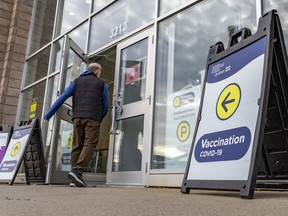Everyone seems to know someone who is sick with the virus these days. My patients are asking questions. Here’s what I tell them.

Article content
It seems everyone knows someone who’s come down with COVID-19 these days. Here are some questions I’m hearing from my patients:
Is COVID-19 still a thing?
COVID-19 is still out there and making waves. As of Oct. 6, according to INSPQ data, of all the tests done across Quebec laboratories, 20 per cent are coming back positive for COVID-19.
For context, the week of March 31, the positivity rate was at about 2.3 per cent. During a big spike in cases the week of Dec. 10, 2023 the positivity rate was at 25.6 per cent.
Advertisement 2
Story continues below
Article content
How is COVID-19 spread?
When people cough, sneeze or talk, viral particles can be sent through the air and via droplets. Masking helps to prevent droplet spread, and keeping more than two metres apart and staying in a well-ventilated area can help to limit aerosol spread.
While not a predominant cause of transmission, COVID-19 can also be spread through objects contaminated with secretions from an infected person. The incubation period for COVID-19 — the time from exposure to developing an infection — is about two to four days with the current variant.
Are the rapid at-home tests reliable?
A positive test is helpful for confirming that someone has COVID-19. However, a single negative test should not reassure you that you have some other virus.
A rapid test relies on viral load — the amount of virus that can be found in your respiratory tract. The higher the viral load, the more virus found in your body and the more easily you can infect others. And sometimes you can have a high enough viral load to infect others, but not high enough to turn a rapid test positive.
The literature suggests viral loads peak on the fourth day of symptoms. If you test negative initially, it is best to isolate as if you have COVID-19 and retest on the fourth day of illness.
Article content
Advertisement 3
Story continues below
Article content
PCR tests done in hospitals or private labs are more accurate because they need to detect only fragments of viral genetic material to show up as positive.
If you are immunocompromised or at risk for severe outcomes from COVID-19, it is best to get a PCR test so you can get timely treatment.
How do I know when to seek care if I have COVID-19?
It’s normal to feel lousy while sick with COVID-19, and for a variety of factors there will be some variation in the intensity and array of symptoms experienced from person to person.
Cough, fever, runny nose, headache, muscle aches and loss of smell are common. Some people may experience nausea or vomiting, and rashes.
While unpleasant, none of these are inherently dangerous. You should start to worry if you begin having chest pain, difficulty breathing, confusion or inability to eat or drink.
If you live alone, try to have someone call to check in on you. When in doubt, call 811 or your pharmacist, or seek care at your local walk-in clinic.
If you are concerned for your safety, present to the emergency room.
Should I get the COVID-19 vaccine?
Advertisement 4
Story continues below
Article content
It is important to have realistic expectations about the COVID-19 vaccine. The vaccine will not prevent you from having symptoms if you get infected. The goal is to prevent severe illness from an infection that can lead to hospitalization and death.
According to Health Canada, “Current evidence suggests protection is more robust and longer lasting with vaccination in previously infected individuals compared to immunity from SARS-CoV-2 infection alone.”
While there is a rare risk of complications from these vaccines (at worst, one per cent of those vaccinated will experience an adverse outcome), there is a much higher risk of complications from the actual COVID-19 infection itself.
Immunity from an infection or from a vaccine is not permanent. The virus mutates into different variants over time, which is why you can get sick repeatedly.
Boosters are vaccines that help protect against the most recent circulating strains. If you have had COVID-19, you need to wait at least three months before being able to have a booster vaccine.
Laura Sang is a family physician who trained at McGill University and is practising in the southern Laurentians. She has master’s of science in public health.
Recommended from Editorial
Advertisement 5
Story continues below
Article content
Article content



Comments